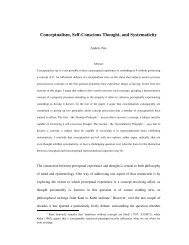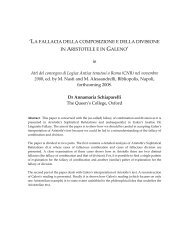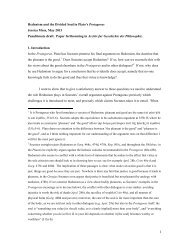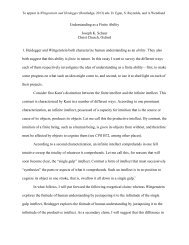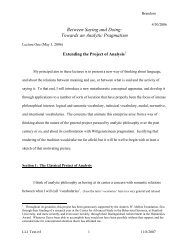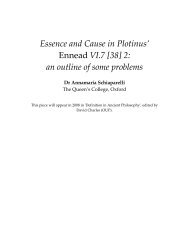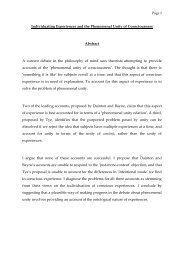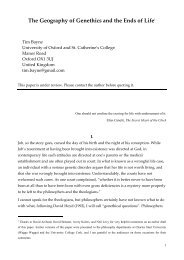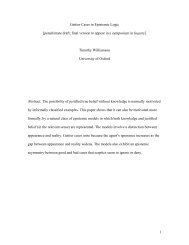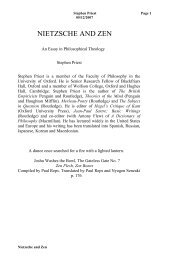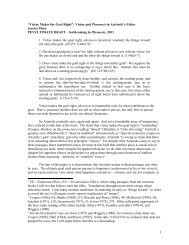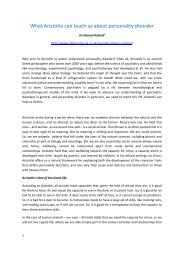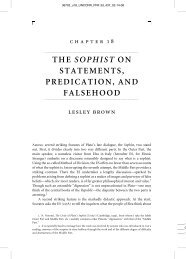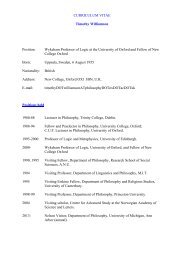de se knowledge and the possibility of an omniscient being
de se knowledge and the possibility of an omniscient being
de se knowledge and the possibility of an omniscient being
Create successful ePaper yourself
Turn your PDF publications into a flip-book with our unique Google optimized e-Paper software.
200 Faith <strong><strong>an</strong>d</strong> Philosophy<br />
14. One might object that even though Sus<strong>an</strong> <strong><strong>an</strong>d</strong> I both have <strong>the</strong> same<br />
first-person proposition as <strong>the</strong> content <strong>of</strong> our <strong>knowledge</strong>, <strong>the</strong>re are differences<br />
in our o<strong>the</strong>r beliefs that account for our differences in behavior. In respon<strong>se</strong><br />
we c<strong>an</strong> suppo<strong>se</strong> that Sus<strong>an</strong> <strong><strong>an</strong>d</strong> I are alike with respect to our entire system <strong>of</strong><br />
beliefs. It will still be <strong>the</strong> ca<strong>se</strong> that we will behave differently.<br />
15. David Lewis, “Attitu<strong>de</strong>s De Dicto <strong><strong>an</strong>d</strong> De Se,” Philosophical Papers, Vol. I<br />
(Oxford: Oxford University Press, 1986) 139.<br />
16. Wierenga (54–56) consi<strong>de</strong>rs Lewis’s example. When Lewis discus<strong>se</strong>s<br />
<strong>the</strong> example <strong>of</strong> <strong>the</strong> gods as <strong>an</strong> objection to a haecceitist account <strong>of</strong> <strong>de</strong> <strong>se</strong>, he<br />
claims that <strong>the</strong> god on <strong>the</strong> tallest mountain knows <strong>the</strong> proposition expres<strong>se</strong>d<br />
by his utter<strong>an</strong>ce ‘I am on <strong>the</strong> tallest mountain’ without knowing that he him<strong>se</strong>lf<br />
is on <strong>the</strong> tallest mountain. Wierenga takes Lewis to be making <strong>the</strong> point<br />
that <strong>the</strong> god doesn’t know <strong>the</strong> utter<strong>an</strong>ce is his utter<strong>an</strong>ce. Wierenga points out,<br />
correctly I think, that this <strong>knowledge</strong> not necessary for <strong>knowledge</strong> <strong>de</strong> <strong>se</strong>. I take<br />
Lewis to be making a different point. The god doesn’t know that <strong>the</strong> proposition<br />
expres<strong>se</strong>d by <strong>the</strong> utter<strong>an</strong>ce is his proposition (that it entailsc his es<strong>se</strong>nce)<br />
even though, according to (W), his <strong>knowledge</strong> <strong>of</strong> <strong>the</strong> proposition counts as <strong>de</strong><br />
<strong>se</strong> <strong>knowledge</strong>.<br />
17. Note that both <strong>of</strong> <strong>the</strong><strong>se</strong> difficulties never ari<strong>se</strong> if <strong>the</strong> proponent <strong>of</strong> firstperson<br />
propositions keeps Chisholm’s Corollary. However, <strong>the</strong> trouble with<br />
Chisholm’s Corollary is that it lacks in<strong>de</strong>pen<strong>de</strong>nt motivation: why c<strong>an</strong>’t someone<br />
distinct from me know <strong>the</strong> same first-person propositions as me? Perhaps<br />
it is exactly this lack <strong>of</strong> in<strong>de</strong>pen<strong>de</strong>nt motivation that leads Wierenga to jettison<br />
it.<br />
18. Lewis (1986). A similar account is pre<strong>se</strong>nted in Chisholm (1981).<br />
19. Lewis, 142.<br />
20. Ibid.<br />
21. Ibid., 143.<br />
22. As noted above, Lewis takes <strong>de</strong> <strong>se</strong> belief to involve <strong>the</strong> <strong>se</strong>lf-ascription <strong>of</strong><br />
a property. For me to believe that my hair is on fire is to <strong>se</strong>lf-ascribe <strong>the</strong> property<br />
<strong>of</strong> having hair that is on fire. For me to know that my hair is on fire, it c<strong>an</strong>not<br />
be <strong>the</strong> ca<strong>se</strong> that I merely <strong>se</strong>lf-ascribe F* since <strong>se</strong>lf-ascription is not sufficient<br />
for <strong>knowledge</strong>. I take <strong>the</strong> locution ‘S knows that she her<strong>se</strong>lf has property P’ to<br />
express <strong>the</strong> <strong>knowledge</strong> <strong>an</strong>alogue <strong>of</strong> ‘S <strong>se</strong>lf-ascribes property P’ for <strong>the</strong> belief<br />
ca<strong>se</strong>.<br />
23. Lewis, 151.<br />
24. See Lewis, 155–57 for what counts as a suitable relation <strong>of</strong> acquaint<strong>an</strong>ce.<br />
In my example I assume that <strong>se</strong>eing counts as such a relation.<br />
25. Lewis, 156.<br />
26. Grim, 171.<br />
27. Ibid.<br />
28. Grim also points out that <strong>the</strong> difficulty does not just lie in <strong>the</strong> fact that<br />
God would need to truly <strong>se</strong>lf-ascribe properties that are contrary to his nature.<br />
If knowing what I know in <strong>the</strong> <strong>se</strong>n<strong>se</strong> <strong>of</strong> (L1) were required for omniscience,<br />
God would also have to truly ascribe contradictory properties to him<strong>se</strong>lf. See<br />
Grim, 172.<br />
29. I would like to th<strong>an</strong>k Lynne Rud<strong>de</strong>r Baker, Phillip Bricker, Chris Heathwood,<br />
Joshua Spencer, Br<strong><strong>an</strong>d</strong>t V<strong>an</strong> <strong>de</strong>r Gaast, <strong>the</strong> audience at <strong>the</strong> 3rd Biennial<br />
Graduate Epistemology Conference at <strong>the</strong> University <strong>of</strong> Rochester, <strong><strong>an</strong>d</strong> two<br />
<strong>an</strong>onymous referees for helpful comments on this paper.



